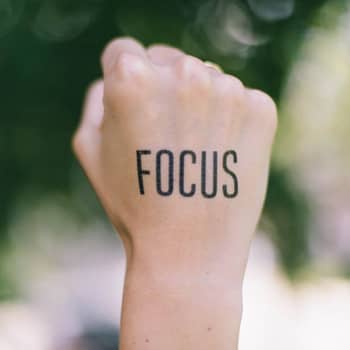Chuyển sang chế độ ngoại tuyến với ứng dụng Player FM !
Focus Your Mind: 3 Powerful Concentration Secrets
Series đã xóa ("Feed không hoạt động" status)
When?
This feed was archived on February 19, 2024 00:56 (
Why? Feed không hoạt động status. Server của chúng tôi không thể lấy được feed hoạt động của podcast trong một khoảng thời gian.
What now? You might be able to find a more up-to-date version using the search function. This series will no longer be checked for updates. If you believe this to be in error, please check if the publisher's feed link below is valid and contact support to request the feed be restored or if you have any other concerns about this.
Manage episode 278015293 series 1375140
 Do you need to focus your mind?
Do you need to focus your mind?
And while you’re at it, would you like to increase your concentration power?
If so, I have 3 simple tips for you that are more powerful than a fistful of focus vitamins or a scientifically questionable brain training app.
And I’ll even reveal what happened when I was attacked personally in an examination and needed these tips in order to keep focused so I could get my Ph.D.!
Want to know the focus secrets that will help you perform even under the most hectic of situations?
Here’s what this post will cover:
1. Focus Your Mind on the Body
2. Focus Your Mind on the Breath
3. Focus Your Mind… on the Mind?
How Do You Mentally Focus?
1. Focus Your Mind on the Body
https://www.youtube.com/watch?v=Y-zTkA8MW2k
Did you know that you can’t effectively work on your mind without also working on your body?
It’s critical to start here because a lot of people think their mind is somehow different than their body. In fact, your mind is produced by your brain, a clump of physical cells located in your skull.
The quality and health of these cells directly shows up in your ability to focus and concentrate.
To start improving, learn to relax your body every time you sit down to study. You can do this by performing muscle relaxation exercises, breathing exercises, and daily meditations.
Let’s look at how to combine all three in a quick morning ritual:
- Get a foam roller or lacrosse balls to help relieve shoulder pain
- Use trigger point therapy to get knots out of your shoulders
- And release a tight IT band
(Be sure to check with your doctor or a physical therapist before taking on any new exercise or physical program.)
I have been using rollers like these for years, and they really set the stage for much greater mental focus than I thought possible.
We all hold far too much tension in our bodies, and this is a simple way to help release a TON of it.
Perform these exercises every day for five minutes before you read or study, and you will undoubtedly note a huge difference.
And if you are a student attending lectures on campus, consider getting a therapy massage cane — you can easily put it in your backpack along with your lacrosse balls for use before lectures.
If you can’t carry such items with you, a simple body scan and deliberate squeezing of your major muscles is another possibility.

For example, before I sat for my dissertation defense – arguably the biggest exam of my life – I moved from my feet all the way up to my forehead, squeezing and releasing my muscles. No one noticed at all, and I waltzed into the room completely relaxed.
In addition to muscle relaxation, I had two other secret weapons that enabled me to focus in the heat of battle where I was attacked personally and managed to do better than survive. Thanks to relaxation and memory techniques, I recited quotes and page numbers and pulled all kinds of abstract knowledge from my head.
In fact, even after I was grilled intensively and even aggressively by one person on the committee, the head examiner said, “Anthony, the only guy cooler than you is Miles Davis.”
What was my second secret weapon?
2. Focus Your Mind on the Breath
My second secret for how to focus right now is breathing.

My favorite breathing exercise is called Alternate Psychic Nostril Breathing.
It’s called “psychic” because you imagine in your mind that you’re inhaling through just one nostril — unlike Alternate Nostril Breathing, where you actually use your hand.
But I didn’t have the concentration and focus skills for that level of kinesthetic visualization in the beginning. So I just started with the regular version.
When you’re ready to switch over to the “psychic” version, just pretend that the nostrils are blocked as you go back and forth. With practice, you’ll find that you can do it all day.
And even if you don’t, you can drop back into it during a moment of tension or stress.
For example, when I was told during my doctoral dissertation that an entire chapter I’d written on Nietzsche had no Nietzsche in it, I didn’t get stressed or choked or panicked.
I just squeezed the muscles in my hands and feet and imagined I was inhaling only through my right nostril and out through my left. By that point, I’d been practicing the technique for a while, which is why it took such immediate effect.
Don’t expect to try it once and suddenly be as calm as a Shaolin Monk!
After this examiner made this accusation and I’d quickly centered myself, I calmly remembered the page number my Nietzsche chapter started on and asked everyone to turn to that page.
Then I quoted Nietzsche in German, one of the most important passages he wrote about friendship, which I’d written about in my dissertation. That quote helped me establish the theoretical grounding I’d laid out, not just in that chapter, but throughout the massive document everyone was now focused on.
But I didn’t have to look because I knew exactly what I’d written and exactly where in the document the passage was located.

One thing I was reminded of that day: people attack each other for a reason, and one of them is because they know how easy it is to break your focus and cause you to make mistakes.
But I don’t care. All that matters is that I was prepared by practicing these focus and concentration techniques.
One key to my success with these focus strategies is to be F.R.E.E. That is, literally:
Frequent practice in a state of…
Relaxation and a spirit of…
Experimentation and always letting these focus and concentration rituals keep you…
Entertained
These two strategies I’ve shared so far using the F.R.E.E. model – when practiced in advance – will help ensure that you’re not so quickly shaken. You might not be “as cool as Miles Davis,” but at least you’ll be moving in the direction of calm focus, cool clarity, and modesty too.
Anyone who has the first world problem of focus and concentration issues while attending university (or reading books they bought off Amazon) can also bring in a bit of gratitude as a strategy too.
Most of us just don’t realize how blessed we are. And that’s because we lack observation skills. This leads us to the third strategy for greater focus…
3. Focus Your Mind… on the Mind?
Let me cut to the chase:
There are lots of kinds of meditation, and tons of confusion out there. I won’t pretend to know the best kind of meditation for you, because it’s not as simple as systematically relaxing your muscles.

But we do know that scientists have found that four times a week minimum is required for greater focus and concentration effects to take place. These don’t have to be hour-long marathons, either. Just ten to fifteen minutes of meditation will do.
I suggest that you do some muscle relaxation and breathing first, and then just set a timer. Tim Ferriss advises that you should set your timer for two minutes less than you think you can sit for.
For example, if you think you can sit for 10 minutes to just watch your thoughts, set it for eight.
And that’s really all you need to do in the beginning. Turn off all the apps and other distractions. Sit just to sit.
There are a variety of meditation techniques – including concentration meditation and visualization meditation – so try them on for size and see what works best for you.
One of my favorites on Gary Weber’s channel is his Kirtan Kriya practice.
https://www.youtube.com/watch?v=ehvokeZnXMM
This simple meditation has been shown to help with memory, focus, and concentration. Kirtan Kriya also enables you to bring in a small amount of movement and sound. It’s also a step in the direction of longer meditations where you work with self-inquiry questions.
But remember, research shows that you’ll want to practice at least four times per week to notice an effect.
And be flexible with yourself. I have bad shoulder impingement issues and bursitis and sadly can’t sit for long meditations at the moment. I have to lay down instead or do them while walking.
But thanks to muscle relaxation, breathing, and meditation, the pain is just something that appears in consciousness. And it’s a heck of a lot less painful than having a bratty professor in the room who just wants you to fail.
And like that professor, both those attacks and this shoulder pain are something frequent meditation helps me simply observe, without getting emotionally tied up in them.
Things in the world are just like waves of the ocean, rolling in and rolling out. They really don’t disturb the shore, which gets stronger and stronger the more you practice these three techniques.
Before we wrap up, I have one more suggestion to help you focus your mind.
How Do You Mentally Focus?
If you’re having a hard time getting little rituals like these into action, here’s the solution that works best for me:
Do all of these three exercises for better focus before you turn on the computer in the morning or look at your phone.
Sometimes I’m not successful at doing that every single morning, but usually I am. If you’re new, even just a 20% success rate across a few weeks is a start.
You can put your phone in a cupboard and make sure your computer is completely turned off. Designate a room in your home or spot where you can focus just on rolling out your muscles, practicing your breathing, and meditating.
Anchor this place in your home with a mental image like the Buddha or Alan Watts, Gary Weber, or something you find peaceful like a tree or flower. Then go to that spot and practice.
Later you can open the great avalanche of the connected world, and you’ll enjoy it with much more focus, concentration, and gratitude because you’ve completed these simple exercises.
And if you want to learn more about my memory techniques – including meditations to help you focus your mind – grab your copy of my book, The Victorious Mind.
484 tập
Series đã xóa ("Feed không hoạt động" status)
When?
This feed was archived on February 19, 2024 00:56 (
Why? Feed không hoạt động status. Server của chúng tôi không thể lấy được feed hoạt động của podcast trong một khoảng thời gian.
What now? You might be able to find a more up-to-date version using the search function. This series will no longer be checked for updates. If you believe this to be in error, please check if the publisher's feed link below is valid and contact support to request the feed be restored or if you have any other concerns about this.
Manage episode 278015293 series 1375140
 Do you need to focus your mind?
Do you need to focus your mind?
And while you’re at it, would you like to increase your concentration power?
If so, I have 3 simple tips for you that are more powerful than a fistful of focus vitamins or a scientifically questionable brain training app.
And I’ll even reveal what happened when I was attacked personally in an examination and needed these tips in order to keep focused so I could get my Ph.D.!
Want to know the focus secrets that will help you perform even under the most hectic of situations?
Here’s what this post will cover:
1. Focus Your Mind on the Body
2. Focus Your Mind on the Breath
3. Focus Your Mind… on the Mind?
How Do You Mentally Focus?
1. Focus Your Mind on the Body
https://www.youtube.com/watch?v=Y-zTkA8MW2k
Did you know that you can’t effectively work on your mind without also working on your body?
It’s critical to start here because a lot of people think their mind is somehow different than their body. In fact, your mind is produced by your brain, a clump of physical cells located in your skull.
The quality and health of these cells directly shows up in your ability to focus and concentrate.
To start improving, learn to relax your body every time you sit down to study. You can do this by performing muscle relaxation exercises, breathing exercises, and daily meditations.
Let’s look at how to combine all three in a quick morning ritual:
- Get a foam roller or lacrosse balls to help relieve shoulder pain
- Use trigger point therapy to get knots out of your shoulders
- And release a tight IT band
(Be sure to check with your doctor or a physical therapist before taking on any new exercise or physical program.)
I have been using rollers like these for years, and they really set the stage for much greater mental focus than I thought possible.
We all hold far too much tension in our bodies, and this is a simple way to help release a TON of it.
Perform these exercises every day for five minutes before you read or study, and you will undoubtedly note a huge difference.
And if you are a student attending lectures on campus, consider getting a therapy massage cane — you can easily put it in your backpack along with your lacrosse balls for use before lectures.
If you can’t carry such items with you, a simple body scan and deliberate squeezing of your major muscles is another possibility.

For example, before I sat for my dissertation defense – arguably the biggest exam of my life – I moved from my feet all the way up to my forehead, squeezing and releasing my muscles. No one noticed at all, and I waltzed into the room completely relaxed.
In addition to muscle relaxation, I had two other secret weapons that enabled me to focus in the heat of battle where I was attacked personally and managed to do better than survive. Thanks to relaxation and memory techniques, I recited quotes and page numbers and pulled all kinds of abstract knowledge from my head.
In fact, even after I was grilled intensively and even aggressively by one person on the committee, the head examiner said, “Anthony, the only guy cooler than you is Miles Davis.”
What was my second secret weapon?
2. Focus Your Mind on the Breath
My second secret for how to focus right now is breathing.

My favorite breathing exercise is called Alternate Psychic Nostril Breathing.
It’s called “psychic” because you imagine in your mind that you’re inhaling through just one nostril — unlike Alternate Nostril Breathing, where you actually use your hand.
But I didn’t have the concentration and focus skills for that level of kinesthetic visualization in the beginning. So I just started with the regular version.
When you’re ready to switch over to the “psychic” version, just pretend that the nostrils are blocked as you go back and forth. With practice, you’ll find that you can do it all day.
And even if you don’t, you can drop back into it during a moment of tension or stress.
For example, when I was told during my doctoral dissertation that an entire chapter I’d written on Nietzsche had no Nietzsche in it, I didn’t get stressed or choked or panicked.
I just squeezed the muscles in my hands and feet and imagined I was inhaling only through my right nostril and out through my left. By that point, I’d been practicing the technique for a while, which is why it took such immediate effect.
Don’t expect to try it once and suddenly be as calm as a Shaolin Monk!
After this examiner made this accusation and I’d quickly centered myself, I calmly remembered the page number my Nietzsche chapter started on and asked everyone to turn to that page.
Then I quoted Nietzsche in German, one of the most important passages he wrote about friendship, which I’d written about in my dissertation. That quote helped me establish the theoretical grounding I’d laid out, not just in that chapter, but throughout the massive document everyone was now focused on.
But I didn’t have to look because I knew exactly what I’d written and exactly where in the document the passage was located.

One thing I was reminded of that day: people attack each other for a reason, and one of them is because they know how easy it is to break your focus and cause you to make mistakes.
But I don’t care. All that matters is that I was prepared by practicing these focus and concentration techniques.
One key to my success with these focus strategies is to be F.R.E.E. That is, literally:
Frequent practice in a state of…
Relaxation and a spirit of…
Experimentation and always letting these focus and concentration rituals keep you…
Entertained
These two strategies I’ve shared so far using the F.R.E.E. model – when practiced in advance – will help ensure that you’re not so quickly shaken. You might not be “as cool as Miles Davis,” but at least you’ll be moving in the direction of calm focus, cool clarity, and modesty too.
Anyone who has the first world problem of focus and concentration issues while attending university (or reading books they bought off Amazon) can also bring in a bit of gratitude as a strategy too.
Most of us just don’t realize how blessed we are. And that’s because we lack observation skills. This leads us to the third strategy for greater focus…
3. Focus Your Mind… on the Mind?
Let me cut to the chase:
There are lots of kinds of meditation, and tons of confusion out there. I won’t pretend to know the best kind of meditation for you, because it’s not as simple as systematically relaxing your muscles.

But we do know that scientists have found that four times a week minimum is required for greater focus and concentration effects to take place. These don’t have to be hour-long marathons, either. Just ten to fifteen minutes of meditation will do.
I suggest that you do some muscle relaxation and breathing first, and then just set a timer. Tim Ferriss advises that you should set your timer for two minutes less than you think you can sit for.
For example, if you think you can sit for 10 minutes to just watch your thoughts, set it for eight.
And that’s really all you need to do in the beginning. Turn off all the apps and other distractions. Sit just to sit.
There are a variety of meditation techniques – including concentration meditation and visualization meditation – so try them on for size and see what works best for you.
One of my favorites on Gary Weber’s channel is his Kirtan Kriya practice.
https://www.youtube.com/watch?v=ehvokeZnXMM
This simple meditation has been shown to help with memory, focus, and concentration. Kirtan Kriya also enables you to bring in a small amount of movement and sound. It’s also a step in the direction of longer meditations where you work with self-inquiry questions.
But remember, research shows that you’ll want to practice at least four times per week to notice an effect.
And be flexible with yourself. I have bad shoulder impingement issues and bursitis and sadly can’t sit for long meditations at the moment. I have to lay down instead or do them while walking.
But thanks to muscle relaxation, breathing, and meditation, the pain is just something that appears in consciousness. And it’s a heck of a lot less painful than having a bratty professor in the room who just wants you to fail.
And like that professor, both those attacks and this shoulder pain are something frequent meditation helps me simply observe, without getting emotionally tied up in them.
Things in the world are just like waves of the ocean, rolling in and rolling out. They really don’t disturb the shore, which gets stronger and stronger the more you practice these three techniques.
Before we wrap up, I have one more suggestion to help you focus your mind.
How Do You Mentally Focus?
If you’re having a hard time getting little rituals like these into action, here’s the solution that works best for me:
Do all of these three exercises for better focus before you turn on the computer in the morning or look at your phone.
Sometimes I’m not successful at doing that every single morning, but usually I am. If you’re new, even just a 20% success rate across a few weeks is a start.
You can put your phone in a cupboard and make sure your computer is completely turned off. Designate a room in your home or spot where you can focus just on rolling out your muscles, practicing your breathing, and meditating.
Anchor this place in your home with a mental image like the Buddha or Alan Watts, Gary Weber, or something you find peaceful like a tree or flower. Then go to that spot and practice.
Later you can open the great avalanche of the connected world, and you’ll enjoy it with much more focus, concentration, and gratitude because you’ve completed these simple exercises.
And if you want to learn more about my memory techniques – including meditations to help you focus your mind – grab your copy of my book, The Victorious Mind.
484 tập
Tất cả các tập
×Chào mừng bạn đến với Player FM!
Player FM đang quét trang web để tìm các podcast chất lượng cao cho bạn thưởng thức ngay bây giờ. Đây là ứng dụng podcast tốt nhất và hoạt động trên Android, iPhone và web. Đăng ký để đồng bộ các theo dõi trên tất cả thiết bị.




